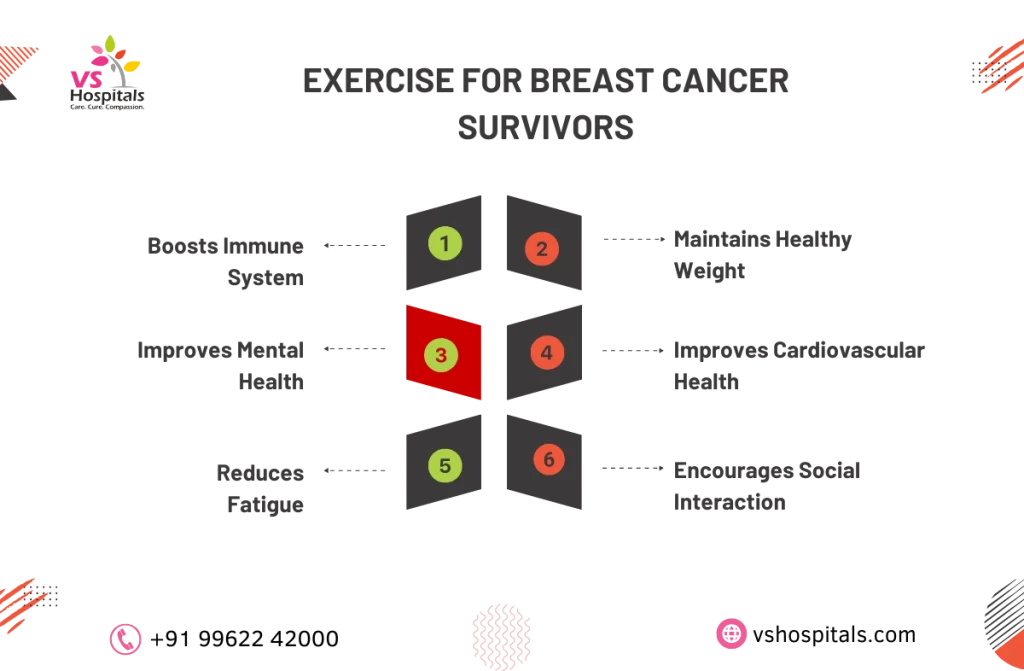Breast cancer lifestyle changes play a crucial role in reducing the risk of developing breast cancer and improving overall well-being. Simple adjustments like regular exercise, maintaining a healthy weight, eating a balanced diet, and avoiding harmful habits such as smoking and excessive alcohol consumption can make a significant difference. By adopting these practices, individuals can take proactive steps toward a healthier lifestyle while minimizing risks associated with breast cancer. Let’s explore these impactful lifestyle changes in detail.

Breast Cancer Lifestyle Changes
Exercise Regularly
Regular exercise reduces breast cancer risks by maintaining a healthy weight, regulating hormones, and improving immune function. Physical activity like walking, swimming, or yoga helps balance body systems and enhances overall wellness. Incorporating exercise into your daily routine not only boosts energy but also lowers stress levels, contributing to long-term health benefits. Aim for at least 30 minutes of moderate physical activity each day.
- Walk briskly to increase heart health and burn calories.
- Explore activities like dance, aerobics, or cycling to stay fit and motivated.
Maintain a Healthy Weight
Maintaining a healthy weight is vital as excess body fat can increase estrogen levels, which may heighten breast cancer risks, especially after menopause. Focus on a balanced diet rich in fruits, vegetables, lean proteins, and whole grains while avoiding high-calorie, sugary, and fatty foods. Pair this with regular physical activity to keep your weight in check and enhance overall health.
- Replace processed snacks with nutrient-dense options like nuts and fresh fruit.
- Use meal prepping and portion control to avoid overeating.
Limit Alcohol and Quit Tobacco
Even small amounts of alcohol increase the risk of breast cancer by affecting hormone levels and damaging cells. Similarly, smoking introduces harmful chemicals into the body, increasing cancer risk. Making lifestyle changes like reducing alcohol consumption and quitting smoking can significantly lower these risks. Seek support if necessary to successfully implement these changes.
- Limit yourself to one drink per day or less, or choose alcohol-free alternatives.
- Join a support group or seek professional help to quit smoking effectively.
Breastfeed if Possible
Breastfeeding provides protective benefits by lowering hormone levels associated with breast cancer risk. It also promotes bonding between mother and baby while offering significant health benefits for both. Mothers who breastfeed for six months or longer experience a reduced risk of certain types of cancer. Breastfeeding is a natural and effective preventive measure.
- Breastfeed exclusively for at least six months for maximum benefits.
- Consult a lactation specialist for help with breastfeeding challenges.
Be Cautious with Birth Control and HRT
Hormonal contraceptives and hormone replacement therapy (HRT) may slightly increase breast cancer risk in some women. Discuss your family history and personal health with a doctor to choose safer options. If using HRT, aim for the lowest effective dose for the shortest duration to minimize risks.
- Explore non-hormonal birth control methods, such as copper IUDs.
- Monitor your health closely while on HRT and discuss alternatives with your doctor.
Avoid Harmful Chemicals in the Environment
Chemicals in plastics, pesticides, cosmetics, and cleaning products can mimic hormones, disrupting the body’s natural balance and potentially increasing cancer risk. Opt for eco-friendly and non-toxic products to minimize exposure to these harmful substances. Simple lifestyle changes like avoiding microwaving food in plastic containers can make a significant difference.
- Choose BPA-free bottles and food storage containers.
- Use organic cleaning agents and beauty products to reduce chemical exposure.
Symptoms of Breast Cancer
Recognizing the symptoms of breast cancer early is crucial for timely diagnosis and treatment. These symptoms can vary, and not all lumps or changes indicate cancer. However, any unusual changes should be evaluated by a healthcare professional. Being vigilant about these signs can make a significant difference in outcomes. Common symptoms of breast cancer include:
- A lump or thickened tissue in the breast or underarm.
- Changes in the shape, size, or appearance of the breast.
- Nipple discharge, which may be clear, bloody, or yellow.
- Skin changes like redness, dimpling, or peeling.
- Persistent breast or nipple pain.
Regular self-checks and screenings are essential for early detection.
Foods to Eat and Avoid
Your diet plays a crucial role in reducing breast cancer risks and supporting overall health. Including nutrient-rich foods while avoiding harmful options can make a significant difference. Focus on foods that reduce inflammation and support hormonal balance while steering clear of those that may contribute to cancer risk, especially in cases like estrogen-positive breast cancer.
Foods to Eat:
- Fruits and Vegetables: Broccoli, spinach, berries.
- Omega-3 Rich Foods: Salmon, walnuts, flaxseeds.
- Whole Grains: Brown rice, oats, quinoa.
Foods to Avoid:
- Processed Meats: Sausages, bacon.
- Sugary Drinks: Sodas, energy drinks.
- High-Fat Dairy: Cream, full-fat cheese.
Breast Cancer Tips and Facts
Breast cancer tips and facts are essential for awareness and prevention. Did you know that early detection can improve survival rates by over 90%? Lifestyle choices, regular screenings, and knowledge of symptoms play a crucial role in reducing risks. Here are some tips and facts to guide you:
- Perform monthly self-breast exams to identify unusual changes early.
- Schedule annual mammograms, especially if you are over 40 or have a family history.
- Avoid processed foods and include cancer-fighting foods like berries and leafy greens.
- Stay physically active and maintain a healthy weight to lower your risks.
Remember, awareness and proactive habits save lives!
Conclusion
Breast cancer lifestyle changes are powerful steps toward reducing the risk of breast cancer and improving overall health. By incorporating habits like regular exercise, a healthy diet, and avoiding harmful substances, you can take control of your well-being. Proactive measures such as breastfeeding, limiting alcohol, and avoiding harmful chemicals make a significant difference. Embrace these changes today to protect yourself and promote long-term health. Small, consistent actions can lead to a healthier, cancer-free future.
Read also Breast cancer food to avoid
